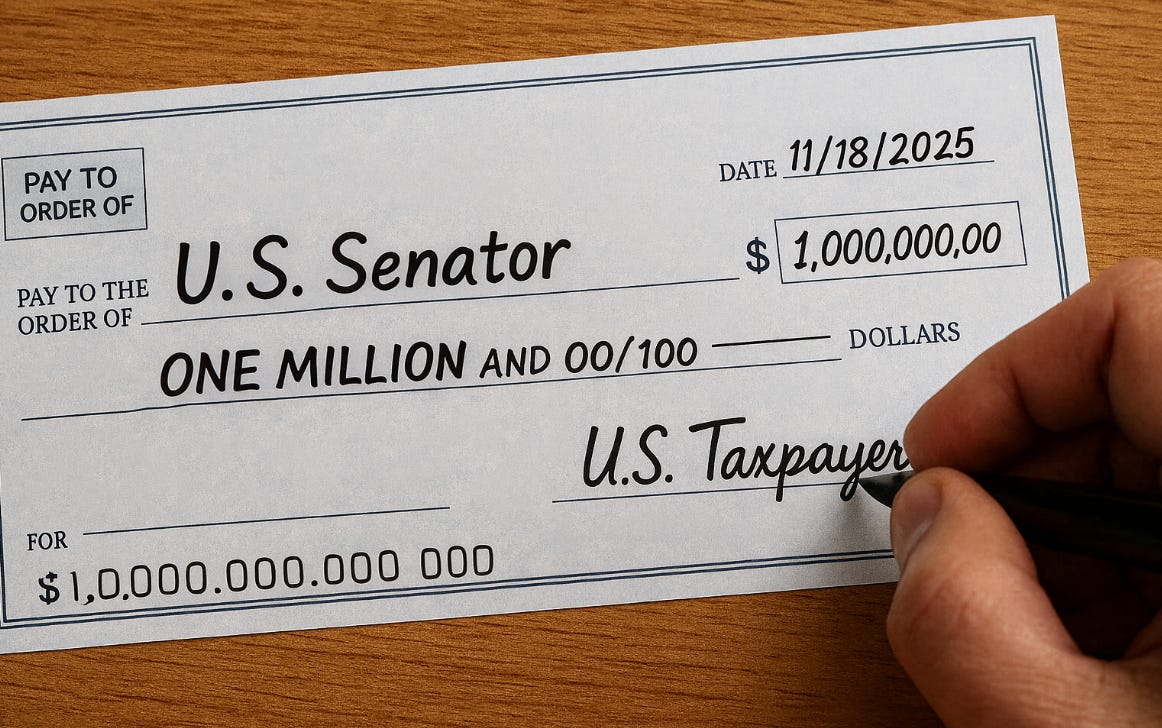When Senators Write Themselves Million-Dollar Checks
How a last-minute provision could enrich eight lawmakers — and why we need to know who’s responsible
While Americans endured the longest government shutdown in U.S. history, someone slipped a provision into the emergency funding bill that could send millions of dollars in taxpayer money into the personal bank accounts of eight U.S. senators.
The provision allows senators to sue the federal government for $500,000 per violation if their phone records were seized without notification. And thanks to a retroactivity clause, it applies perfectly to eight specific senators whose records were subpoenaed during an investigation into efforts to overturn the 2020 election.
Senate Majority Leader John Thune inserted the language into the bill. But we don’t know which senators — if any of the eight who stand to benefit — were involved in drafting it or pushing for its inclusion. That’s exactly what needs investigation.
Why This Violates Senate Ethics Rules
Senate Rule 37 is crystal clear: Lawmakers cannot use their legislative power to advance legislation whose “principal purpose is to further only his [financial] interest... or only the [financial] interest of a limited class of persons” when they’re part of that class.
This provision was so narrowly crafted that it essentially has eight names on it. It all points to one purpose: creating a payday for a very limited group of sitting senators.
And at least one is already planning to cash in. Senator Lindsey Graham announced he’d “definitely” sue and wouldn’t settle for just a million dollars: “I want to make it so painful, no one ever does this again.”
This movement is demanding answers
This is why Bright America partners with Campaign Legal Center (CLC). While others were still processing the news, CLC filed a formal complaint with the Senate Ethics Committee demanding an investigation.
The complaint asks the critical question: Did any of the eight senators who stand to benefit play a role in drafting or promoting this legislation? If so, they violated Senate ethics rules designed to prevent exactly this kind of self-dealing.
As CLC’s Kedric Payne stated:
“Elected officials are expected to use their power to support legislation that serves the public, not their own personal financial interests. If a group of senators use an emergency funding bill ending the longest government shutdown in U.S. history to unexpectedly create a personal benefit potentially worth millions of dollars for a limited group, they enrich themselves and damage the public’s trust.”
The Backpedaling Begins
The provision sparked immediate bipartisan outrage. House Speaker Mike Johnson promised a vote to repeal it. Several of the eight senators who would benefit started distancing themselves — calling it a “bad idea” or claiming they didn’t know about it.
But here’s what’s telling: Senator Ron Wyden noted that Republicans seemed to be providing cover for each other, with Thune potentially taking the heat for rank-and-file senators who actually demanded the provision.
That’s why the Ethics Committee investigation matters. We need to know who was really behind this.
Why This Can’t Become Normal
This isn’t just about eight senators potentially getting rich off taxpayers. When lawmakers can use emergency legislation — during a crisis affecting millions of Americans — to create personal windfalls, we’ve crossed a dangerous line.
The careful drafting, the retroactivity, the $500,000-per-violation structure — this wasn’t an accident or oversight. Someone designed this to benefit a specific group of senators, and we deserve to know who.
Every time we accept corruption without demanding accountability, we make the next abuse of power easier.
What You Can Do
Contact the Senate Ethics Committee and demand they investigate who was responsible for this provision: mailbox_office@ethics.senate.gov
Call your senators and ask them to support repealing this provision — and to go on record about whether they had any involvement in its creation.
Support the fight. Your Bright America subscription directly funds Campaign Legal Center’s work, including this ethics complaint and the litigation that follows.
The Senate Ethics Committee must investigate. We need to know which senators violated ethics rules to enrich themselves. And those responsible must be held accountable.
Our democracy doesn’t defend itself. We have to defend it — together.


